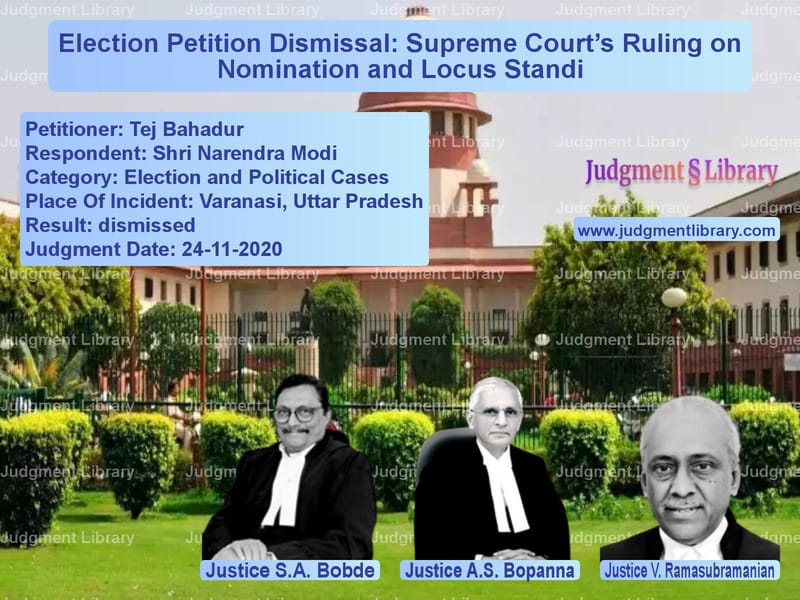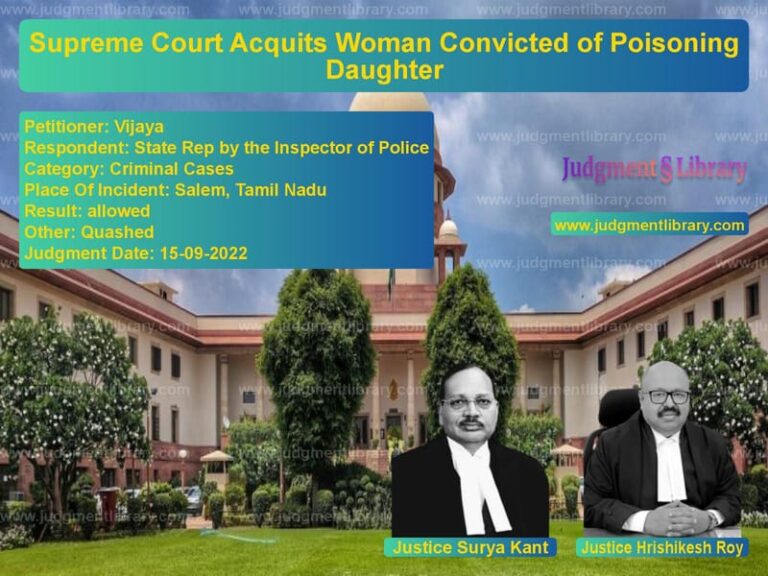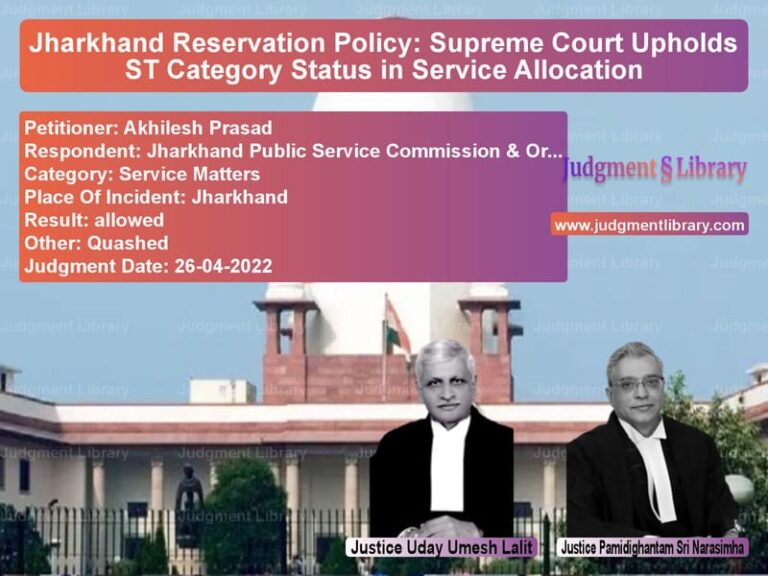Election Petition Dismissal: Supreme Court’s Ruling on Nomination and Locus Standi
The case revolves around the dismissal of an election petition challenging the election of Shri Narendra Modi to the 17th Lok Sabha from the Varanasi Constituency. The appellant, Tej Bahadur, contested the election on the grounds of improper rejection of his nomination and the failure to disclose certain facts in the respondent’s nomination. The appellant also alleged misuse of official power during the election process. The case raises crucial issues regarding the locus standi to file an election petition, the requirements for valid nominations, and the power of the Election Tribunal to dismiss a petition.
Background of the Case
The election for the Varanasi Parliamentary Constituency in the 17th Lok Sabha elections was held in April-May 2019. The appellant, Tej Bahadur, contested the election against Shri Narendra Modi but his nomination was rejected due to non-compliance with the statutory requirements under the Representation of the People Act, 1951. The appellant’s nomination papers were found to be incomplete, as they lacked the necessary certificate from the Election Commission stating that he had not been dismissed for corruption or disloyalty to the State.
Following the rejection of his nomination, Tej Bahadur filed an election petition to challenge the election of Narendra Modi, alleging that his own nomination had been wrongly rejected and that the respondent had failed to disclose essential facts in his nomination. Additionally, he claimed that the election process was vitiated due to the misuse of official powers by the Returning Officer and the Election Observer.
Petitioner’s Arguments
The petitioner, Tej Bahadur, argued that:
- His nomination papers were improperly rejected because he was not given sufficient time to provide the necessary certificate from the Election Commission, which was required under Section 9(2) and Section 33(3) of the Act.
- He was wrongly excluded from the election process despite his eligibility, and this exclusion amounted to a denial of justice.
- The election process itself was flawed due to the misuse of official power by the Returning Officer and the Election Observer.
“The rejection of my nomination was based on an unreasonable interpretation of the law, and the lack of time to provide the necessary certificate caused undue prejudice to my rights as a candidate.”
Respondent’s Arguments
The respondent, Shri Narendra Modi, countered the petitioner’s claims by asserting that:
- The rejection of the appellant’s nomination was in accordance with the statutory requirements, as the necessary certificate was not provided by the appellant within the prescribed time.
- The appellant was not an elector in the Varanasi constituency, and thus did not have the legal standing to challenge the election.
- The petition lacked merit, as it did not fulfill the requirements of the Representation of the People Act and should therefore be dismissed.
“The appellant’s nomination was rightly rejected, and his petition is baseless, as he has no legal standing to file such a petition due to his failure to meet the nomination requirements.”
Supreme Court’s Ruling
The Supreme Court, after hearing the arguments of both parties, dismissed the appellant’s election petition. The Court observed the following:
- The rejection of the appellant’s nomination was based on the clear and mandatory requirements of the Representation of the People Act. Since the appellant failed to provide the required certificate, his nomination could not be deemed valid.
- The appellant did not meet the legal requirement to file an election petition, as he was neither an elector in the Varanasi constituency nor a candidate. According to Section 81 of the Representation of the People Act, only electors or candidates can file such petitions.
- The Court held that the absence of the certificate and the failure to comply with statutory nomination requirements meant the appellant was not duly nominated, and therefore, he had no right to challenge the election results.
- The Court further emphasized that the provisions under Section 33(3) of the Representation of the People Act were imperative, and the law explicitly stated that a person without the required certificate could not be considered a duly nominated candidate.
“A person who fails to meet the mandatory statutory requirements, such as providing the necessary certificate, cannot be considered a duly nominated candidate and thus has no locus to challenge the election results.”
Conclusion
The Supreme Court’s decision reinforced the strict adherence to the statutory requirements under the Representation of the People Act. The dismissal of the election petition highlights the importance of complying with the legal formalities for filing nominations and the standing of a petitioner in challenging election results. The Court also made it clear that only those who meet the criteria outlined in the law—such as being an elector or a duly nominated candidate—have the right to file an election petition.
Petitioner Name: Tej Bahadur.Respondent Name: Shri Narendra Modi.Judgment By: Justice S.A. Bobde, Justice A.S. Bopanna, Justice V. Ramasubramanian.Place Of Incident: Varanasi, Uttar Pradesh.Judgment Date: 24-11-2020.
Don’t miss out on the full details! Download the complete judgment in PDF format below and gain valuable insights instantly!
Download Judgment: Tej Bahadur vs Shri Narendra Modi Supreme Court of India Judgment Dated 24-11-2020.pdf
Direct Downlaod Judgment: Direct downlaod this Judgment
See all petitions in Fundamental Rights
See all petitions in Constitution Interpretation
See all petitions in Legislative Powers
See all petitions in Judgment by S. A. Bobde
See all petitions in Judgment by A. S. Bopanna
See all petitions in Judgment by V. Ramasubramanian
See all petitions in dismissed
See all petitions in supreme court of India judgments November 2020
See all petitions in 2020 judgments
See all posts in Election and Political Cases Category
See all allowed petitions in Election and Political Cases Category
See all Dismissed petitions in Election and Political Cases Category
See all partially allowed petitions in Election and Political Cases Category







